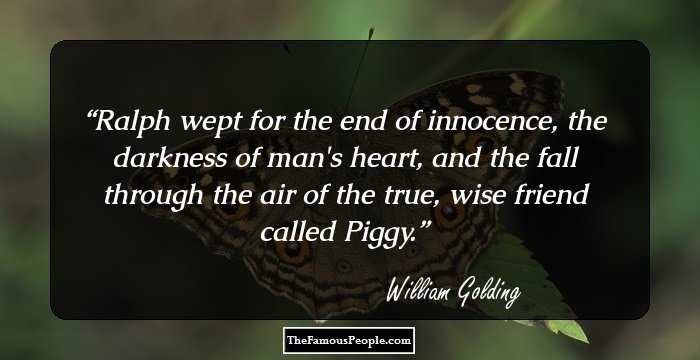Thinking as a hobby william golding – In the realm of literature and philosophy, William Golding’s exploration of thinking as a hobby stands as a profound and enduring contribution. Golding’s unique perspective on the nature of thought, deeply rooted in his personal experiences and literary prowess, has left an indelible mark on our understanding of human cognition and its profound implications.
Throughout his literary works, Golding masterfully portrays the complexities of thought and its consequences, inviting readers to grapple with the profound depths of human nature. From the savage instincts unleashed in “Lord of the Flies” to the clash of civilizations in “The Inheritors,” Golding’s characters grapple with the intricate web of thoughts, beliefs, and desires that shape their actions and destinies.
The Concept of Thinking as a Hobby

Thinking as a hobby involves engaging in reflective and analytical activities for personal enjoyment and intellectual stimulation. It encompasses a range of practices, from philosophical contemplation to scientific inquiry, that aim to develop cognitive skills, expand knowledge, and foster a deeper understanding of the world.
Benefits of Thinking as a Hobby
- Enhanced problem-solving abilities
- Increased creativity and innovation
- Improved self-awareness and introspection
- Reduced stress and anxiety
- Greater enjoyment and fulfillment in life
Challenges of Thinking as a Hobby
- Can be time-consuming and require sustained effort
- May involve confronting uncomfortable truths or challenging beliefs
- Can lead to overthinking and rumination
William Golding’s Perspective on Thinking: Thinking As A Hobby William Golding

William Golding, the renowned British novelist, held a profound belief in the power and importance of thinking. He viewed it as a fundamental human activity that shapes our understanding of ourselves and the world around us.
Golding’s Experiences and Thinking
Golding’s experiences during World War II, particularly his observations of human nature under extreme conditions, influenced his perspective on thinking. He believed that humans are inherently capable of both good and evil, and that thinking plays a crucial role in determining which path we choose.
Thinking as a Theme in Golding’s Works

Thinking is a central theme in Golding’s novels, particularly in “Lord of the Flies” and “The Inheritors.” In these works, he explores the complexities of thought and its consequences, examining how characters grapple with moral dilemmas, social conventions, and the nature of human nature.
“Lord of the Flies”
In “Lord of the Flies,” Golding depicts a group of young boys stranded on a deserted island who descend into savagery and violence. The novel highlights the dangers of unchecked thinking, as the boys’ initial idealism and innocence are gradually corrupted by fear and the desire for power.
“The Inheritors”
In “The Inheritors,” Golding explores the encounter between Neanderthals and Cro-Magnons. The novel raises questions about the nature of intelligence, language, and the role of thinking in human evolution.
The Impact of Golding’s Ideas on Contemporary Thinking
Golding’s work has had a significant influence on modern philosophers and psychologists. His insights into the nature of thinking and human behavior have challenged traditional assumptions and inspired new ways of understanding the human mind.
Influence on Philosophy, Thinking as a hobby william golding
Golding’s ideas have been influential in the field of moral philosophy, particularly in the study of ethics and the nature of good and evil. His work has also influenced philosophers who explore the relationship between language and thought.
Influence on Psychology
Golding’s work has also influenced psychologists, particularly those interested in the development of human consciousness, social behavior, and the role of cognition in human evolution.
Applying Golding’s Ideas to Personal Development

Golding’s principles of thinking can be applied to personal development to enhance cognitive skills and foster a deeper understanding of oneself and the world.
Developing Thoughtful Practices
- Engage in regular reading and writing
- Practice active listening and open-minded dialogue
- Seek out new experiences and perspectives
- Reflect on past experiences and learn from mistakes
- Cultivate a sense of curiosity and wonder
Benefits of Thoughtful Practices
- Increased creativity and problem-solving abilities
- Enhanced self-awareness and emotional intelligence
- Improved communication and interpersonal skills
- Greater resilience and adaptability
- A more fulfilling and meaningful life
FAQ Summary
What is the central idea behind thinking as a hobby?
Thinking as a hobby involves engaging in the act of thinking as a recreational activity, akin to pursuing a pastime such as painting or playing music. It entails actively exercising one’s cognitive abilities, exploring ideas, and delving into the depths of contemplation for the sheer enjoyment and intellectual stimulation it brings.
How did William Golding’s experiences shape his perspective on thinking?
Golding’s experiences during World War II, particularly his time spent as a naval officer, profoundly influenced his views on human nature and the complexities of thought. Witnessing the horrors of war firsthand led him to question the inherent goodness of humanity and explore the dark recesses of the human psyche, themes that are deeply reflected in his literary works.